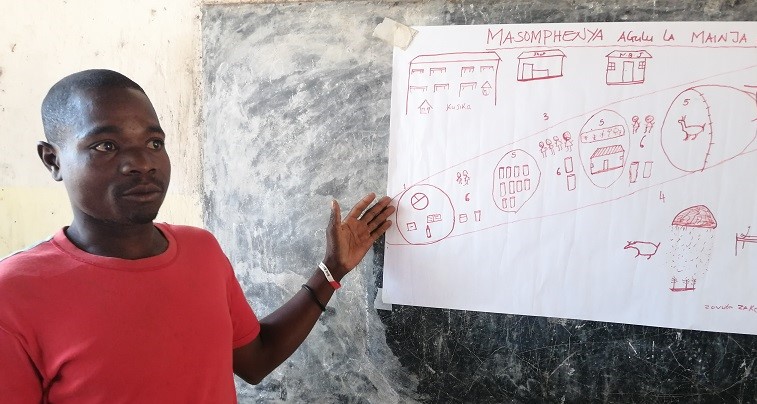Productivity gains in Malawi to be sustained and scaled-up through new strategic approach - IOE
Rome, 17 May 2022 – IFAD-supported programmes in Malawi have initiated many positive practices that would need to be sustained and scaled up. Between 2016 and 2022, projects have achieved significant increases in productivity, through provision of technology, inputs and irrigation. In most cases, these gains were eroded soon after project completion. For this reason, the Independent Office of Evaluation of IFAD (IOE) is recommending the development of a strategic approach for enhancing the impact and scale of successful practices and initiatives. These and other findings emerging from IOE’s Malawi Country Strategy and Programme Evaluation (CSPE) were presented and discussed on 17 May 2022, during a virtual workshop.
“A lot of good things have started. We have a large number of initiatives and practices. We’ve seen a thousand flowers blooming in Malawi, but we want them to cover larger areas and have a more transformative impact. Productivity gains are often eroded as soon as farmers stopped receiving inputs from the projects. We need to think beyond the project’s immediate support. For this, we need to have a more strategic approach to taking initiatives and practices to scale”, stated Ms Johanna Pennarz, Lead Evaluation Officer at IOE.
The IFAD programme initiated many positive practices in Malawi, which community level organisations have often not been able to sustain after project closure. The country programme invested heavily into institution building. Nevertheless, sustainability met institutional and financial challenges, including insufficient funds and capacities at decentralised levels, low government ownership and insufficient integration of project activities into Government’s annual work plans and budgets. Farmers groups were not formalised and empowered to engage with other value chain actors, in particular vendors, traders and processors.
Co-organized by the Government of Malawi and IOE, in collaboration with IFAD’s East and Southern Africa Division (ESA), the on-line virtual workshop brought together a wealth of high-level attendants, including Eng Geoffrey Mamba, Director of Irrigation Services, Ministry of Agriculture; and Dr McDonald Mafuta Mwale, Secretary to the Treasury, Ministry of Finance. Over 80 participants joined the event, representing the government of Malawi, development partners, civil society organizations, private sector partners, and IFAD senior management and staff.
The main objectives of the CSPE were to assess the results and performance of the ongoing Country strategic opportunities paper/programme (COSOP) 2016-2022; and to generate findings, conclusions and recommendations for the next COSOP in 2022.
“This is the first CSPE in Malawi, which presents a perfect opportunity to assess the results of IFAD projects and country strategy in Malawi. We expect that the findings and recommendations from this CSPE will inform the structure and strategic focus of the next COSOP. Therefore, the importance of this workshop cannot be overemphasized”, affirmed Dr McDonald Mafuta Mwale.
IFAD’s financial allocations have almost doubled between 2016-2022. Projects became larger and included an increasing number of stakeholders and service providers to deliver the expected results. The country programme supported a large number of initiatives, innovations, pilots and practices, many of them supported by additional grants. These efforts initiated many positive practices.
“IFAD projects have increased the capacity of our farmers to produce more even in the wake of increased calamities such as floods and droughts. We also need to ensure that, as a Ministry, we implement projects and programmes that are funded by IFAD by following the right procedures and rules. For this reason, we are very excited to listen to IFAD colleagues during today’s workshop”, noted Eng Geoffrey Mamba.
These achievements notwithstanding, the project had limited success in diversifying production systems and securing reliable market access for smallholder farmers. Trade-offs exist between smallholders’ concerns about food self-sufficiency and the transition to market production. Recent operations tried to address the multiple challenges through complementary designs, but in practice overlaps and synergies were too few to make a step change.
In light of the successes and constraints encountered, the IOE report recommends that IFAD’s next COSOP adopt an explicit approach to addressing chronic food insecurity and malnutrition through diversified and sustainable production system, and include a clear strategy on how it will enhance the impact of successful practices, support coherent roll out across districts and use the lessons learned to enhance the effectiveness and impact of upcoming initiatives and operations.
“The project had limited achievements in diversifying production systems and securing reliable market access for smallholder farmers. Food remains the most important expenditure item for smallholder farmers. Moving forward, IFAD would have to further enhance its support to sustainable and diversified production systems and take decisive steps to resolve the ongoing implementation challenges. To this aim, realistic implementation planning and effective oversight are of paramount importance”, highlighted Dr Indran A. Naidoo, Director of IOE.
IFAD began operations in Malawi in 1981. Since then, it has provided USD 350.5 million lending, contributing to a cumulative USD 652.4 million in financing for 14 programmes, four of which are ongoing. The portfolio supports rural poverty reduction and agricultural development, by investing in a range of activities and sectors.
For further information, please contact Alexander Voccia at [email protected]


